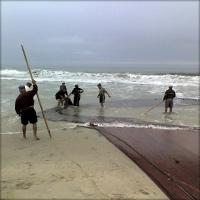Framework
In a national context, the artisanal fisheries assume increasing importance due to a variety of factors, namely their strong presence along the Portuguese coast; the great diversity of fishing gears and target species; the high commercial value of the products; the large number of fishermen and other stakeholders involved; the socio-economic and cultural importance at local, regional and/or national level and the decreasing importance of the traditional fisheries performed undertaken by the distant fleet. Moreover, in some regions and in all productive structures, the fishery represents one of the components of greatest relevance. Nevertheless, the importance of the fisheries is poorly recognized at both national and European Community levels. This reflects the fact that fishermen are poorly organized and therefore weakly represented in local, regional, national and European Community administration organisms. As a consequence, fishermen are often ignored in decision-making on the management measures that regulate their fisheries. However, certain management measures might have serious implications at both social and economic levels, not only for the fishermen involved, but also for their families. On the other hand, artisanal fisheries have been heavily penalized by the rising fuel prices and problems concerning marketing and distribution of the fishing products, leading to lower profitability of the fishing activity, which is the main source of increasing fishing effort on coastal resources. Furthermore, the low economic diversity that characterizes most fishing communities makes them highly dependent on fishing, which valuates the importance of the Atlantic fishing grounds. In addition, it is well known that the collapse of any fishing resource exploited by the artisanal fleet spreads rapidly in the form of economic crisis, affecting not only fishermen but also many other jobs directly or indirectly related to this activity. It is in this context that the PRESPO project is developed.








